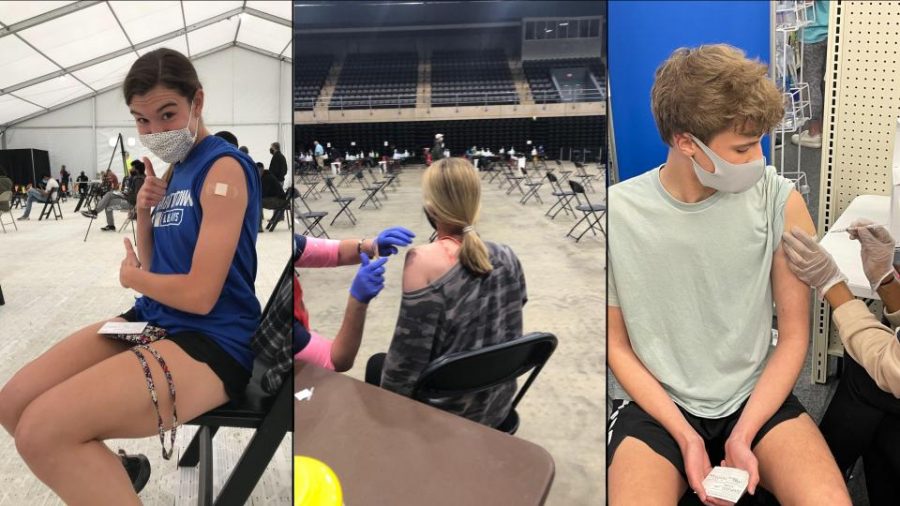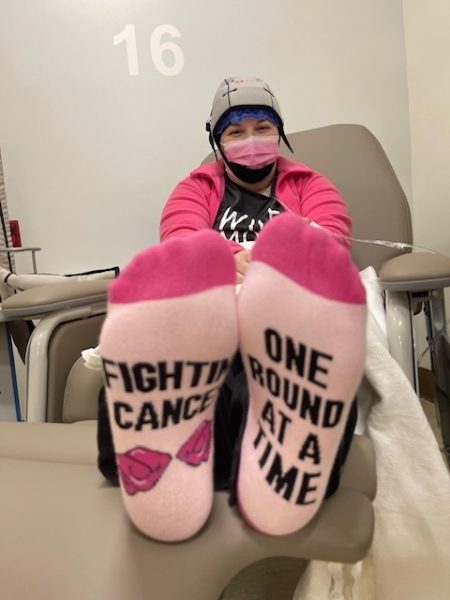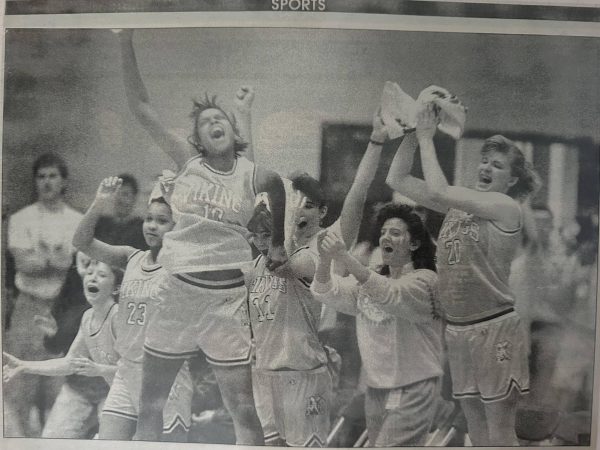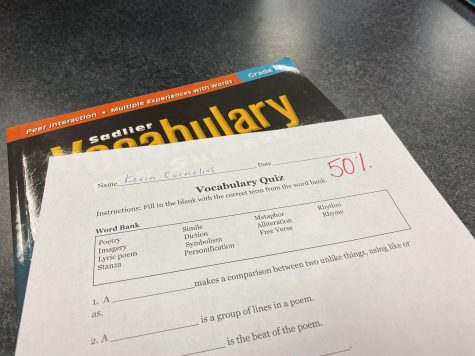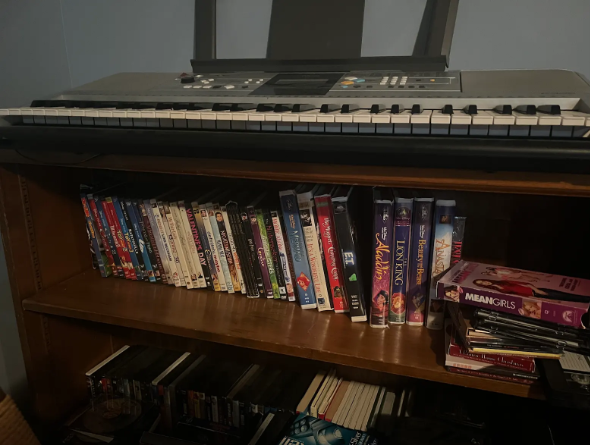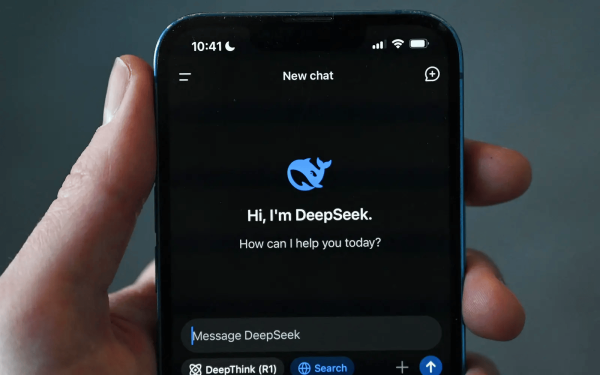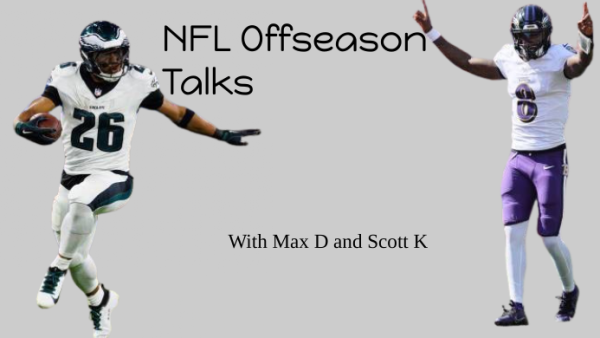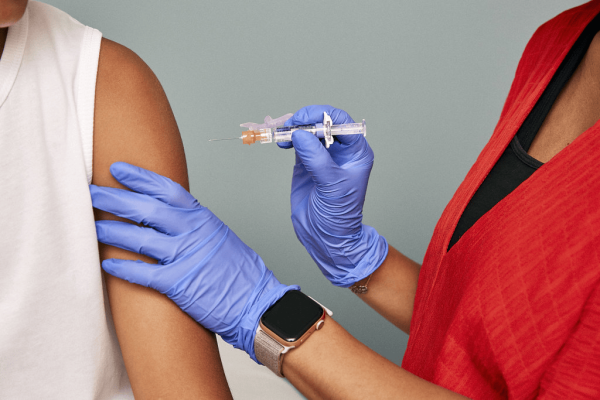Colleges are requiring COVID-19 vaccinations for the 2021-2022 school year: High schools should follow suit
School leaders feel pressure as colleges across the country push for vaccination mandates
Elizabeth Rajnik, Sammie Hoefs, and Dan Golemboski, receive their first dose of the Pfizer vaccine.
Imagine: all students walk into the building on their first day of school, the sun slowly rising behind them. Lunch boxes in hand and smiles hidden by masks, students are excited to be back in the building with all their peers. The bell rings at 7:30 a.m. Kids are crowded into classrooms, ready to learn. Pods of desks and social interaction is welcome.
What was once such a simple concept seems so far out of reach.
Many universities across the nation have already begun requiring COVID-19 vaccination as a condition of being on campus for the coming school year. With the higher education scene taking steps toward reclaiming their normalcy, why are public high schools unable to do the same?
Why are colleges requiring vaccinations for in-person learning?
Considering the increase in the availability of COVID-19 vaccinations, many colleges are making efforts to encourage, and even enforce, vaccination of students and faculty who will be returning to campus the next school year.
Linganore High School principal Cindy Hanlon is one of many parents ensuring their child receives a vaccination to attend school in the 2021-2022 school year. Her daughter at Rutgers University is required to be vaccinated in order to return to campus. Rutgers was the first university to mandate the COVID-19 vaccine.
Regardless of a vaccination mandate, many large universities, including Rutgers, are continuing to stay primarily virtual because it will take time to achieve herd immunity.
“I watched her sign up for classes, and the courses next year are still virtual. So even though Rutgers has mandated the vaccination, they are not ready to fully open because they know it is going to take time,” said Hanlon.
While this is frustrating for both college students and their parents, vaccination requirements will allow universities to reduce the likelihood of infections and outbreaks, as well as pursue a steady return to the pre-pandemic college lifestyle.
Hood College, a private liberal-arts college located in Frederick, Maryland is aiming to provide a sense of normalcy to their students in the 2021-2022 school year. With a student population of just under 2,500, Hood College staff don’t think their goal is out of reach.
Amanda Rzepkowski, the Wellness Director of Hood College said, “Encouraged by lower positivity rates and increased vaccination availability, we find ourselves looking forward with hope and optimism. The college is planning for an in-person experience for all undergraduate classes in the fall of 2021. Graduate classes will also be predominately in-person, with some existing online and hybrid course options.”
At this time, Hood College is not mandating a COVID-19 vaccine to return to campus next school year. The school continues to take necessary CDC precautions and encourages their students to get the vaccine.
“Hood College is closely monitoring guidance on vaccine administration and requirements from the Frederick County and Maryland State Departments of Health and the Centers for Disease Control and Prevention (CDC). We are very encouraged that to date, over 167 Hood community members have reported getting one of the available vaccines. This is exciting as we hope for a return to ‘near normal’ in the fall,” said Rzepkowski.
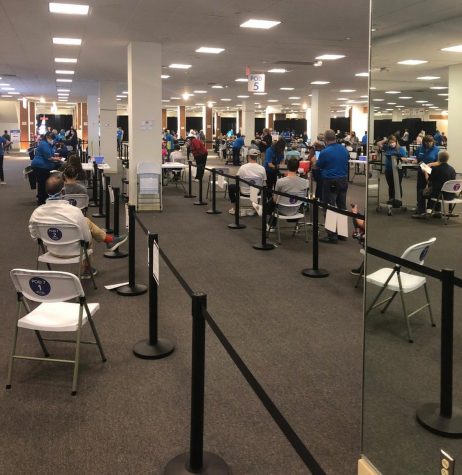
College students are eager to return to the “college experience.” Many students found themselves locked in dorm rooms, attending virtual classes, unable to participate in school-wide activities, and restricted to severe CDC guidelines throughout the 2020-2021 school year. Quite a few are learning from home.
Gracie Brubaker, a junior at Elizabethtown College was one of many student athletes who suffered from the COVID-19 pandemic.
“As a college athlete, COVID-19 cancelled my team’s regular fall soccer season. Preseason normally starts in August, but with COVID-19, athletics were shut down. In October we were able to start non-contact practices in small pods of about eight, with masks and lots of social distancing. That lasted for about two weeks but was soon cut short due to a spike in COVID-19 cases on campus. After another pause within athletics, we were eager to meet with our pods as we returned to campus in February for the second semester,” said Brubaker.
Brubaker has already received both doses of the Moderna vaccine. While Elizabethtown College is not mandating a COVID-19 vaccine, Brubaker thinks a vaccine requirement would allow for a return to normal sports seasons next year.
“If there is a decrease in COVID-19 cases and threatening symptoms, athletics are likely to continue. I think the vaccine is a tool we can use to our advantage to limit the number of COVID-19 cases among the student population,” said Brubaker.
Aside from athletics, Brubaker has missed engaging in everyday activities and traditions as a college student.
Brubaker said, “Eating lunch with a group of friends is nearly impossible in the cafeteria with limited seats and plexiglass between two people. Several clubs that I am a part of used to meet in person, but our meetings are via Zoom now. Every year in April 1, help with the Special Olympics; however, this event was cancelled this year. This year has brought forth several obstacles but Elizabethtown has worked diligently to keep the campus safe all while trying to continue the college’s traditions.”
Why should public high schools follow suit?
Although the public high school setting differs greatly from the university experience, high school students would still similarly benefit from heightened safety and a potential return to normal schooling.
Dr. Barbara Brookmeyer, a health officer for the Frederick County Health Department said, “Vaccination requirement is helpful to increase the proportion of the population that has immunity from the infectious disease that the vaccine targets. The benefits of immunity against a specific infectious disease include fewer persons with infections, fewer serious infectious, less suffering in short/medium/long-term, less time missed from school, less likely to get behind in school, less missed work by parents, less missed income by parents when missing work, less spread of infectious to other family members/friends/community members.”
In fact, many public school students, teachers, and staff have already received their vaccinations in an attempt to at least partially reclaim control over their normal lives.
“I just received my first shot of Pfizer on April 15. I went to Six Flags and it was amazing. It was super efficient and I didn’t even have to leave my car!” said junior Maeve Smarick.
Similar to colleges, requiring high school students to become vaccinated prior to the upcoming school year would produce multiple benefits such as enhanced in-person instruction and an increase in collaboration, sharply contrasting from this year’s mostly online environment.
Junior Victoria Garofolo said, “It has definitely impacted my school year in a negative way. I have a really hard time with virtual learning, and my grades have suffered the consequences. I kind of lost my love for school. Hybrid has helped a little, but I still find myself putting things off. That being said, I am excited for next year and being able to return to school and hopefully be able to keep up my motivation and strive academically.”
A vaccine requirement would also permit the existence of improved extracurricular and athletic events, which would allow next year’s students to enjoy many of the experiences that had to be cancelled this year.
“I think they should [require vaccination next year]. I think with everyone getting the vaccine, it can ensure a safer playing environment for everyone and their loved ones by reducing the chances of spreading COVID-19, especially in contact sports...I think that the vaccine could bring the possibility to play without masks if FCPS decides it is safe to do so. In my opinion, a vaccine requirement can really help bring the season closer to how it was before COVID-19. It won’t be exactly the same, but it’ll be a start,” said Garofolo.
Aside from the numerous educational, recreational, and safety reasoning for requiring public schools to require vaccination for in-person attendance, there is also the argument that multiple other immunizations are already required to attend public school. This means that a similar process could also be used to require the COVID-19 vaccine for next year.
Hindrances to vaccine requirement are inevitable, but not insurmountable
While vaccine requirement as a condition of in-person learning seems to be a logical and responsible decision, execution and enforcement are easier said than done. To start, teens may not need vaccination as urgently as college students since they are all local and do not live at the school. Also, many teens are not eligible because they are not 16.
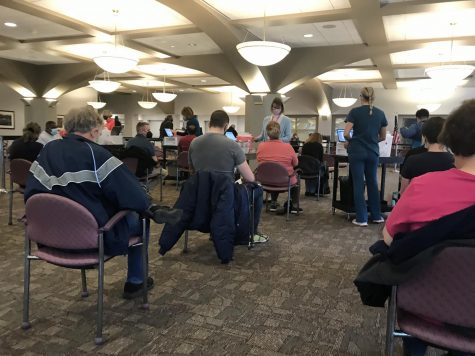
“Only 1 of the 3 vaccines that were approved for FDA Emergency Use Authorization is permitted to be administered to persons under age 18. The Pfizer vaccine can be administered to persons as young as 16. Pfizer recently submitted results for the FDA to review of the study trials among persons as young as age 12. It is too soon to say what vaccines will be available in the near future, and how feasible it will be to have all students vaccinated before the start of the next school year,” said Brookmeyer.
Even so, high schoolers would still benefit greatly from improved safety and education. And yet, another obstacle to the requirement is refusal to become vaccinated, as many may feel uncomfortable getting a new vaccination or have personal, religious, medical, or other reasons for not becoming vaccinated.
“I don’t believe we should and I don’t believe we will [require vaccination]. As a country and government it is a choice. Certainly we want people to, but it isn’t required. It was my hope and I encouraged students to, but it is a personal choice and I don’t think we can regulate that,” said Hanlon.
With that being said, students who do not wish to receive the COVID-19 vaccination would still have options, as FCPS has announced that they will offer students the choice between a full in-person or fully virtual schedule for the 2021-2022 school year. In this manner, public schools are attempting to encourage vaccination while simultaneously still acknowledging the need for alternate accommodations.
“I think it kind of goes to how fast you want to get herd immunity versus how long you are willing to wait. But again with a mandate, it’s still going to take time for availability. Even if we mandated it, it is not available widely and not every age group is approved yet. So I think the encouraging strategy is probably our first strategy. We [FCPS] are looking for a plan to come back five days a week. It is a calculated risk. You can decide if you want to take the risk or not,” said Hanlon.
Although private schools work to propose their own scheduling plans for the upcoming year, public high schools still must function in conjunction with local health organizations. In other words, legal processes must be taken into account in order to add the COVID-19 vaccination requirement as a condition of enrollment and attendance.
Brookmeyer said, “FCHD does not have the authority to mandate vaccination for school entry in Frederick County Public Schools. The current required vaccines for school entry are on the list of vaccines that the Patient Protection Affordable Care Act (PPACA) has required to be provided at no charge or out of pocket cost to the person/family being vaccinated by the insurance companies.”
While the legal and procedural aspect of an additional vaccine requirement might slow the process, it would not be impossible to handle. The COVID-19 vaccination requirement could potentially piggyback off of current vaccine requirement guidelines for public schools, or even be expedited due to the uniqueness of the circumstances. Regardless, at least making efforts toward increasing the vaccination rate among school-goers is essential.
“While I understand many people have their own beliefs in regards to vaccines, keeping students and staff healthy should be the top priority. Some people are unable to receive vaccinations due to allergies and other health conditions and they rely on others around them to be vaccinated . . .The science supporting the vaccines is very strong and I don’t see why anyone wouldn’t want to receive the vaccine,” said Smarick.
A need for pre-pandemic normalcy outweighs the skepticism
With the increase in types of vaccines available, vaccination sites, and expansion of eligibility, vaccination appears to be the main source of hope for many, as well as a major driving force toward safer societal functioning.
And so, as colleges are beginning to mandate vaccines, high schools should consider doing the same in order to improve quality of education, safety, and student life.
Your donation will support the student journalists of Linganore High School. Your contribution will allow us to purchase camera/recording equipment and software. We hope to raise enough money to re-start a monthly printed issue of our paper.



